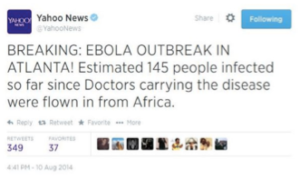Guest Post by Kelley Dodge ’16
 One of the most pivotal time periods for print culture was the Industrial Revolution, where a boom in business demanded innovations in the printing industry. The mechanization of printing allowed for more work to be published more quickly, and an expanded transportation network facilitated greater distribution of this work. This allowed for a much quicker spread of information and ideas. However, such advances in publishing were not met without opposition. Many traditionalists worried that these improvements to the printing industry would lead to the spread of controversial and radical ideas.
One of the most pivotal time periods for print culture was the Industrial Revolution, where a boom in business demanded innovations in the printing industry. The mechanization of printing allowed for more work to be published more quickly, and an expanded transportation network facilitated greater distribution of this work. This allowed for a much quicker spread of information and ideas. However, such advances in publishing were not met without opposition. Many traditionalists worried that these improvements to the printing industry would lead to the spread of controversial and radical ideas.
Many parallels can be drawn between the impact of publishing innovations during the Industrial Revolution and today. With the rise of smartphones and the age of texting and social media, ideas have the ability to be spread almost instantaneously. The dissemination of information in today’s age is much quicker than that during the Industrial Revolution, making publishing even more susceptible to the spread of false information and radical ideas.
 There are many chilling examples of the rate at which false information can be spread, ranging from fear about Ebola to misidentification of suspects in major crimes. For example, after the Boston Marathon Bombing in 2013, a Reddit user posted a picture of a missing Brown University student, claiming he resembled the bombing suspect who had been pictured in a baseball hat. Within hours, Sunil Tripathi’s name had spread all over Facebook and television media and was even trending internationally on Twitter. However, he actually had absolutely nothing to do with the attack.
There are many chilling examples of the rate at which false information can be spread, ranging from fear about Ebola to misidentification of suspects in major crimes. For example, after the Boston Marathon Bombing in 2013, a Reddit user posted a picture of a missing Brown University student, claiming he resembled the bombing suspect who had been pictured in a baseball hat. Within hours, Sunil Tripathi’s name had spread all over Facebook and television media and was even trending internationally on Twitter. However, he actually had absolutely nothing to do with the attack.
This is just one example of how easily digitally published content can be disseminated. One post can reach millions of people in a matter of minutes. In an age where many people’s primary source of news and information is social media, it is important to be cautious of what you believe. Always check the validity of sources and do further research before jumping to conclusions.
For an interesting read and more information about misinformation in the hunt for the Boston Bombing suspects, see this article.
For another example of the spread of misinformation, check out this article about Ebola and social media.

 Follow
Follow